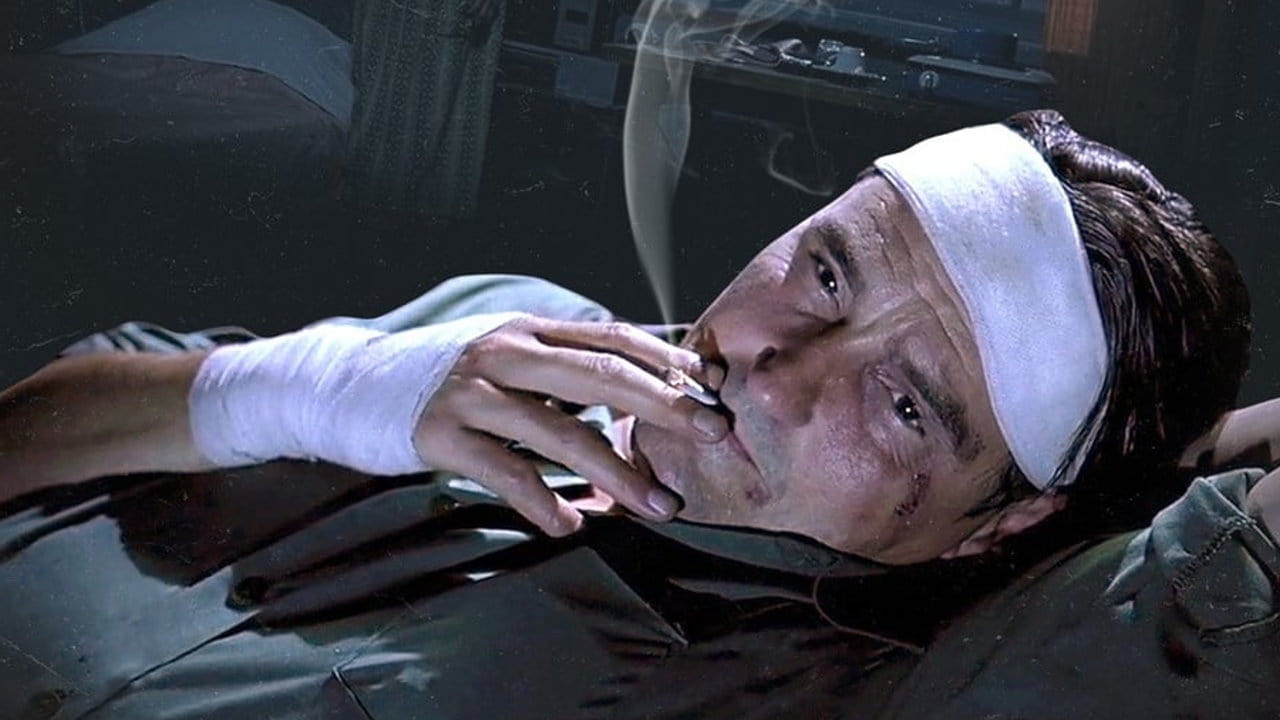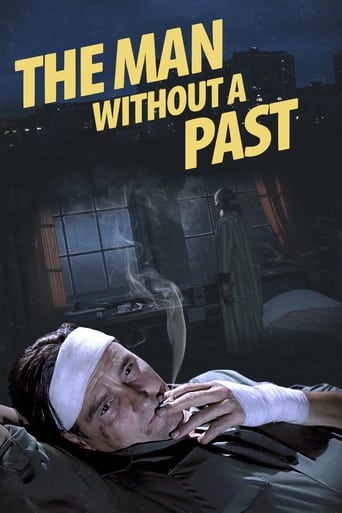Perry Kate
Very very predictable, including the post credit scene !!!
CommentsXp
Best movie ever!
Roxie
The thing I enjoyed most about the film is the fact that it doesn't shy away from being a super-sized-cliche;
Cassandra
Story: It's very simple but honestly that is fine.
Arttu Huoviala
The art of Finnish silence is beautifully captured to this Kaurismäki's movie. In Finland, one does not need words to say things. Controlled silence and meaningful looks work as well and often it isn't even recommended to speak about emotions and feeling to other people. Even when it's not a comedy it can still be funny occasionally and one can quite easily symphatize the main characters.Even though the plot is a quite easy to follow, there is a nice surprise in the end. The prejudice of Finnish melancholy gets wrecked a little with a happy ending. And it did warm my heart when the bad guys were beaten.
Laura Hein
A subtle piece of artwork by Aki Kaurismäki, The Man Without a Past, tugs at the heartstrings of viewers with its simplistic and good nature. After being beaten severely, "M", the main character played by stone-faced Markku Peltola, wakes in a hospital with no knowledge of his life beforehand. He is essentially rescued by a small, poverty-ridden family who helps regain his health in order for him to start his life over again. In starting this new life, he meets a Salvation Army worker by the name of "Irma", played by Kati Outinen, who initially helps him and with whom he immediately feels a comradery with; the two eventually start seeing each other. After being witness to a bank robbery, "M", is confronted by police when he refuses to give personal information under the reasoning of amnesia. The police start looking into his identity and find his lack of involvement in the robbery as well as people from his past.The theme of isolation and abandonment is prevalent throughout the film. The main characters memory has essentially abandoned him and because of this, he is isolated from his past and he must start over again. He is also isolated from the majority of society because of the fact that he must begin his new life in abject poverty. One of the first things he is able to do is rent a place to live and he spends time cleaning it; essentially clearing the slate for his new life. Besides pure hard work, how does "M" continue on in his new life? The only reason "M" becomes a success story is because of the kindness of others who give "M" opportunities without asking for much, if anything, in return. The biggest example of the kind-heartedness in this film is Irma and the work she does with the Salvation Army. It is important to not ignore the fact that the Salvation Army is affiliated with Christian values and ideals. These Christian values can be attributed to most characters in this film. And contrary to other Nordic films, there is no sex whatsoever in The Man Without A Past. This is definitely something that could be attributed to the Christian moral compass we see in the film.Although there are strong Christian themes in the film, there are also strong undertones of humor. This is a very different kind of humor. It is a humor that would not be successful to American audiences. The characters rarely change facial expression or voice intonation, but along with this, very witty, humorous things are said constantly. This would be considered very dry humor or even deadpan humor. It comes off as very subtle and a viewer may not understand its intent towards the beginning of the film. However, by the time the idea of the sweetheart of a female dog named "Hannibal" who may tear oneself to shreds is introduced, the humor is well established and becomes more manageable to viewers. The humor is never overt which puts a genuine smile on one's face.Over the hour and a half the film takes place in, we must notice how slow developing and simple the plot or story is. We simply follow the story of one man and his attempt to begin a new life. We see various situations he is put into and various people he meets, however, we never are troubled with intersecting story lines of different characters. The audience just follows "M" and his struggles. While the story develops, many different things happen such as a new rock band is formed and the viewer is expected to just accept the new happenings rather than question them. The question of, "why?" is not an issue. Why is the new rock band formed? Just because it is.The Man Without A Past is a truly delightful and genuine comedic drama that shows a simple idea and story can be just as engaging as the most complicated of stories. The film highlights the good nature of simple people who truly feel the need to help the main character begin his life anew. Although the humor may be lost to some, especially American audiences, it breaks up the depressing difficulties "M" must deal with in his new life. As vicious as "Hannibal's" owner makes "Hannibal" seem, the dog really puts a light in "M's" eyes for the first time in the film and us as the audience root for him to succeed from that point on.
imitsi
The film is about a man who gets amnesia after being attacked by a group of thugs in Helsinki. He becomes part of a community of underprivileged workers who assist him in building his life together.I can't decide whether there was something wrong with the acting or it was an accurate interpretation of Finnish mannerisms. The acting appeared a bit stiff and silent, and there wasn't a single smile throughout the film - even in situations which were meant to be funny. Having said that, there is a warmth and humanity coming out of these austere characters - just not the way we're used to. The cinematography is great, with stunning visuals of the gritty Helsinki suburbs. It is not a masterpiece, but if you are a fan of international cinema you will enjoy watching it.
lanman-678-734085
Centered on a man suffering from amnesia and a loss of identity, Aki Kaurismaki's The Man Without a Past is a "comedic" documentary on his upbringing in cinematic form. This film is part of trilogy which focuses on themes experienced by Kaurismaki growing up; for instance homelessness, unemployment, and loneliness. Although labeled as a comedy, it is a lot more amusing to those familiar with Finnish society. To a person from the states, the movie seems dry and emotionless. But to anyone familiar with Finnish society, this is very normal. Fins aren't very keen on showing emotion, expressions, or even small talk-unless drinking is involved.A metal worker, whom the film refers to as "M" in the credits played by Markku Peltola, arrives in a strange city by train, and is mugged on a park bench by goons and left for dead. He escapes the hospital and is found near a river and brought in by a family. He finally comes to and has lost not only his shoes-removed by a passing bum-but also his memory of anything in his previous life. But while he is now alienated from himself and roaming a Finnish landscape surrounded by poverty, M is also unshackled.M's life as a laborer has left his hands callused and his face evident of wear and tear, but his new life has new meaning. He finds friendship among other homeless "clients" of the Salvation Army, a new home in an old shipping container, and romance with a mellow Salvation Army worker, Irma played by Kati Outinen. Homelessness is viewed differently than it is in the states. It is looked at as more of a housing problem than a social problem. In addition to M being homeless, Kaurismaki also shows us a homeless man living in a dumpster, which M actually befriends.The characters, in spite of their air of despondent expressionless, expose their oddities, their passions and the oddball dignity that unites them. The film highlights the sense of community felt between its members. In addition to Irma, the man's new companions include an sociable drinker Nieminen, played by Juhani Niemela, and his family, and Antilla, played by Sakari Kuosmanen, a security guard who is landlord of the shipping-container shantytown and who fancies himself a ruthless and fearsome enforcer of law and order.Kaurismaki wanted his social, economic, and political ideas to be on display in this film. Kaurismaki's fascination with the past, both music and movies, is apparent throughout the film. M's love for music survived his memory loss beating and even calls for a reformation of the Salvation Army band to play more "rhythm music," or blues, R&B, and rock n' roll. After establishing himself in a house, M also commandeers a jukebox which constantly spits out "rhythm" music, again attesting to Kaurismaki's obsession with vintageness.On the evidence of this hilarious and humane movie, these views are, like those of any great artist, at once perfectly clear and not easily summarized. His ethical ideals are perhaps most succinctly expressed in an exchange between the hero and a worker from the municipal utility company who runs a cable from a nearby power line to the man's makeshift home (and later helps repair the jukebox). The electrician brusquely refuses payment, asking only the promise of future consideration in exchange for his favor: "If you see me lying face down in the gutter," he says, "turn me on my back."

